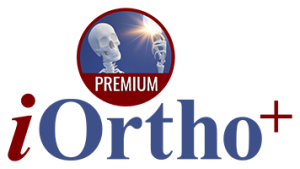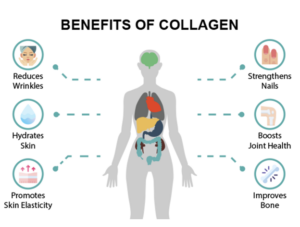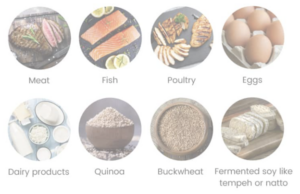 Importance of Collagen Supplements
Importance of Collagen Supplements 
Did you know that collagen is the most abundant protein in your body? It is an important supplement for soft tissue repair of tissues like skin, ligaments, tendons, and muscles. The many components collagen can influence include:
-
Tissue structure & strength – collagen makes up ~30% of our bodies protein content. It helps regenerate the extracellular matrix for tissue healing and remodeling.
-
Supports flexibility & elasticity – important to allow tissues to withstand stress & remain resilient under pressure.
-
Stimulates new tissue growth – can stimulate new collagen production to repair tissue damage & facilitate tissue recovery.
-
Inflammation & recovery – can mitigate the inflammatory response that can impair healing, as well as reduce pain & stiffness in the process.
-
Support healthy weight management – supplemental branch-chain amino acids have been shown to preserve lean body mass & enhance weight loss
-
Help encourage muscle mass – amino acids are the building blocks of muscle. Amino acid supplementation can help aging individuals prevent muscle loss and athletes facilitate muscle growth.

This is wonderful information to enhance our health and facilitate recovery. However, there is a fair amount of controversy about the components of collagen supplementation and how much is best for optimal dosage. Thus, it is beyond the scope of this blog to make a recommendation since it will have limited ability to be evidence based. What can be said is collagen is essential and should be increased in our diet with injury and with aging.
Let’s look at the scope of the data. Assuming an individual is eating a healthy diet, a general recommendation has ranged from 5 to 15 grams per day of collagen peptides. Yet this number has nothing to do with an individual’s size, i.e. grams per unit of body weight. Shouldn’t that be important? Likewise, the recommendation is assuming a healthy diet. Is the person eating enough of the following foods to be consuming the essential amino acids?

For those who are working to recover from an injury or those individuals progressing through the aging process (>65 yrs), a recommendation of 10 to 20 grams per day have been suggested. Other groups to be included in the higher dosage may be those individuals who are engaging in high levels of physical activity and/or working on building muscle and those individuals who are on restricted diets.
Before we target the types of collagen options, let’s talk about WHEN to take the collagen. Ingestion may be best post-exercise or injury but the optimal window has some flex. One common recommendation is to take collagen with vitamin C. Vitamin C is a water-soluble vitamin which plays a key role in the formation of collagen fibers and even has anti-inflammatory properties. A deficiency in Vitamin C can put tissue at risk for injury due to a lack of collagen synthesis causing tissue weakness. An increase in Vitamin C intake can be very influential for healing connective tissue from injury because it causes early angiogenesis and increases collagen synthesis through increased production of glycine, proline, and hydroxyproline. This allows for faster production of type 1 collagen. This type of collagen is the most abundant form in skin, tendons, ligaments, and bones. In general, citrus fruits are the foods rich in Vitamin C. Food for which a single serving size supplies over 50% of the daily value (DV) include peppers (red & green), OJ/oranges, grapefruit juice, kiwi, broccoli, strawberries, and brussel sprouts. Other foods include tomatoes/tomato juice, cantaloupe, cabbage, and cauliflower.
Now is the part of the blog that is a bit more challenging…….the best type of collagen. We know there are 20 difference amino acids: 9 essential (our bodies much ingest them) and 11 non-essential (our bodies can produce them). The essential amino acids are:
-
Lysine: Lysine is necessary for growth and tissue repair as well as the production of several hormones, proteins and enzymes.
-
Leucine: This essential amino acid is involved in protein synthesis, wound healing, blood sugar control and metabolism.
-
Isoleucine: Research shows that isoleucine aids in detoxification, immune function and hormone excretion.
-
Tryptophan: Tryptophan is one of the most well-known amino acids that increases levels of serotonin, a neurotransmitter that regulates mood, pain, appetite and sleep.
-
Phenylalanine: This amino acid helps produce other amino acids as well as neurotransmitters like dopamine and norepinephrine.
-
Threonine: Research indicates that threonine forms the foundation of connective tissues like collagen and elastin.
-
Valine: Valine supports brain function,muscle coordination and calmness.
-
Histidine: This amino acid maintains the health of myelin sheaths in the human body, which protects nerve cells against damage.
-
Methionin: Research suggests methionine keeps skin elastic and helps strengthen the hair and nails.
In contrast, non-essential amino acids are:
-
Arginine: Arginine stimulates immune function, fights fatigue and optimizes heart health. Creatine monohydrate is formed in the liver, pancreas and kidneys, mostly with the help of arginine, glycine and methionine.
-
Alanine: Research suggests that alanine aids in metabolism and provides energy for muscles, brain and central nervous system.
-
Cysteine: Cysteine is the main type of protein found in hair, skin and nails, and it is crucial for collagen production and skin health.
-
Glutamate: This non-essential amino acid acts as a neurotransmitter in the central nervous system.
-
Aspartate: Aspartate helps produce several other amino acids, including asparagine, arginine and lysine.
-
Glycine: Glycine functions as a neurotransmitter to support brain health.
-
Proline: Proline is found in collagen, which helps promote joint health, metabolism and skin elasticity.
-
Serine: Serine is necessary for fat metabolism, immune function and muscle growth.
-
Tyrosine: Tyrosine helps synthesize thyroid hormones, melanin and epinephrine.
-
Glutamine: Studies indicate that glutamine supports many metabolic processes and provides energy for the cells in the body.
-
Asparagine: Asparagine acts as a diuretic, and it optimizes brain and nerve cell function.
We also know supplements that contains collagen types I and III are the most potent of soft tissue repair. We want to consume a supplement with all amino acids in a peptide format to enhance absorption. Most experts say the peptides should be a hydrolyzed powder also. Hydrolyzed means it is broken down into smaller peptides for maximal absorption. It is best to avoid artificial sweeteners, any flavorings, binders, additives, or fillers ….the cleaner the better so nothing impacts absorption!
Depending on the sources you read, there may be differences in “where” the collagen originates. It is possible the product does not tell you the source. Some say marine collagen is best but that could come a very large network of sources. Shark, shellfish, and jellyfish are poorly absorbed. Seafood sources may also contain wide ranges of mercury. The exception to this may be Wild Alaskan Pollock, known to have very low levels of mercury. Some believe bovine sources are the better alternative.
In the end, knowing the content of the product and if it has been tested by an independent third-party testing to verify the quality of the product. Unfortunately, this process can be costly to the manufacturer but without it, the consumer will be uncertain of the product content and potential efficacy.
References:
 Importance of Collagen Supplements
Importance of Collagen Supplements 


